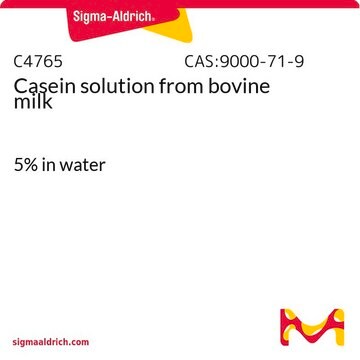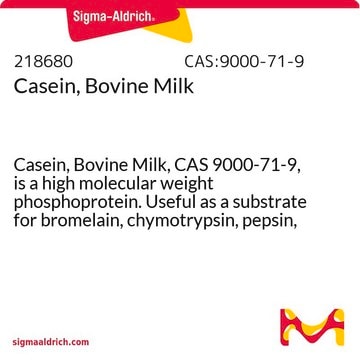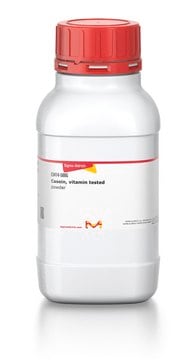C8654
Casein sodium salt from bovine milk
Synonym(s):
Sodium caseinate
Sign Into View Organizational & Contract Pricing
All Photos(2)
About This Item
Recommended Products
biological source
bovine milk
form
powder
technique(s)
electrophoresis: suitable
immunocytochemistry: suitable
ligand binding assay: suitable
color
white to yellow
solubility
H2O: soluble 50 mg/mL, Grade III
Looking for similar products? Visit Product Comparison Guide
Application
Casein sodium salt from bovine milk is suitable for use in:
- the preparation of casein-based diets to investigate nutritional effect of vitamin E in diets for Litopenaeus vannamei postlarve
- in an assay to determine the activity of a three-enzyme solution containing trypsin, chymotrypsin and peptidase
- a study to investigate the effects of bovine somatotropin (bST) administration and abomasal casein infusion on nitrogen metabolism in Holstein steers
- as constituent of blocking solution in immunoblotting.
Biochem/physiol Actions
α-Casein can be an immunogen in young children, and anti-α-casein antibodies have strong cross-reactivity with insulin. This effect can explain the uncommon insulin autoimmunity, but it does not appear to progress to Type I diabetes.
Casein sodium salt from bovine milk is a phosphoprotein. There are four main types of Casein which make up approximately 80% of the total protein in bovine milk: α-s1 Casein, α-s2 Casein, β-Casein, and κ-Casein. Casein is proposed to be the main protective constituent in milk.
Storage Class Code
11 - Combustible Solids
WGK
WGK 3
Flash Point(F)
Not applicable
Flash Point(C)
Not applicable
Personal Protective Equipment
dust mask type N95 (US), Eyeshields, Gloves
Certificates of Analysis (COA)
Search for Certificates of Analysis (COA) by entering the products Lot/Batch Number. Lot and Batch Numbers can be found on a product’s label following the words ‘Lot’ or ‘Batch’.
Already Own This Product?
Find documentation for the products that you have recently purchased in the Document Library.
Customers Also Viewed
Rinke J van Tatenhove-Pel et al.
The ISME journal, 15(10), 3050-3061 (2021-05-07)
As natural selection acts on individual organisms the evolution of costly cooperation between microorganisms is an intriguing phenomenon. Introduction of spatial structure to privatize exchanged molecules can explain the evolution of cooperation. However, in many natural systems cells can also
K L Houseknecht et al.
The Journal of nutrition, 122(8), 1717-1725 (1992-08-01)
The effects of bovine somatotropin (bST) administration and abomasal protein infusion on nitrogen metabolism were investigated using four abomasally-cannulated Holstein steers in a 4 x 4 Latin square design. Treatments were factorially arranged to include daily abomasal infusion (water or
Kristin Røen Fauske et al.
Nutrients, 10(6) (2018-06-01)
A large fraction of the n-3 polyunsaturated fatty acids (PUFAs) in cod fillet is present in the form of phospholipids (PLs). Freezing initiates hydrolysis of the PLs present in the fillet. Here, we compared the effects of Western diets based
Brent Cezairliyan et al.
Proceedings of the National Academy of Sciences of the United States of America, 114(37), E7796-E7802 (2017-08-30)
Pathogenic bacteria secrete toxins and degradative enzymes that facilitate their growth by liberating nutrients from the environment. To understand bacterial growth under nutrient-limited conditions, we studied resource allocation between cellular and secreted components by the pathogenic bacterium
Keonhee E Kim et al.
Oecologia, 193(2), 299-309 (2020-05-18)
Temperature and nutrition are amongst the most influential environmental determinants of Darwinian fitness in ectotherms. Since the ongoing climate warming is known to alter nutritional environments encountered by ectotherms, a precise understanding of the integrated effects of these two factors
Our team of scientists has experience in all areas of research including Life Science, Material Science, Chemical Synthesis, Chromatography, Analytical and many others.
Contact Technical Service












